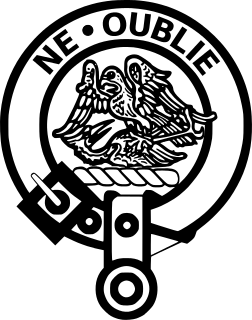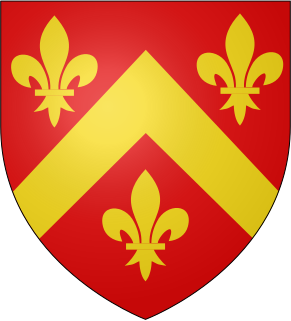Related Research Articles

The Highlands is a historical region of Scotland. Culturally, the Highlands and the Lowlands diverged from the Late Middle Ages into the modern period, when Lowland Scots replaced Scottish Gaelic throughout most of the Lowlands. The term is also used for the area north and west of the Highland Boundary Fault, although the exact boundaries are not clearly defined, particularly to the east. The Great Glen divides the Grampian Mountains to the southeast from the Northwest Highlands. The Scottish Gaelic name of A' Ghàidhealtachd literally means "the place of the Gaels" and traditionally, from a Gaelic-speaking point of view, includes both the Western Isles and the Highlands.

A Scottish clan is a kinship group among the Scottish people. Clans give a sense of shared identity and descent to members, and in modern times have an official structure recognised by the Court of the Lord Lyon, which regulates Scottish heraldry and coats of arms. Most clans have their own tartan patterns, usually dating from the 19th century, which members may incorporate into kilts or other clothing.

John Graham of Claverhouse, 1st Viscount Dundee, known as the 7th Laird of Claverhouse until raised to the viscountcy in 1688, was a Scottish soldier and nobleman, a Tory and an Episcopalian. Claverhouse was responsible for policing south-west Scotland during and after the religious unrest and rebellion of the 1670s/80s.

Bonnie Dundee is the title of a poem and a song written by Walter Scott in 1825 in honour of John Graham, 7th Laird of Claverhouse, who was created 1st Viscount Dundee in November 1688, then in 1689 led a Jacobite rising in which he died, becoming a Jacobite hero.

Robert Roy MacGregor was a Scottish outlaw, who later became a folk hero.

Clan Graham is a Scottish clan who had territories in both the Scottish Highlands and Lowlands.

Clan Murray is a Highland Scottish clan. The chief of the Clan Murray holds the title of Duke of Atholl. Their ancestors who established the family in Scotland in the 12th century were the Morays of Bothwell. In the 16th century descendants of the Morays of Bothwell, the Murrays of Tullibardine, secured the chiefship of the clan and were created Earls of Tullibardine in 1606. The first Earl of Tullibardine married the heiress to the Stewart earldom of Atholl and Atholl therefore became a Murray earldom in 1626. The Murray Earl of Atholl was created Marquess of Atholl in 1676 and in 1703 it became a dukedom. The marquess of Tullibardine title has continued as a subsidiary title, being bestowed on elder sons of the chief until they succeed him as Duke of Atholl.

The Clan Wallace is a Lowlands Scottish Clan and is officially recognized as such by the Lord Lyon King of Arms. The most famous member of the clan was the Scottish patriot William Wallace of the late 13th and early 14th centuries.

Clan Broun also known as Clan Brown is a Scottish clan.

Clan Moncreiffe is a Highland Scottish clan.

The languages of Scotland are the languages spoken or once spoken in Scotland. Each of the numerous languages spoken in Scotland during its recorded linguistic history falls into either the Germanic or Celtic language families. The classification of the Pictish language was once controversial, but it is now generally considered a Celtic language. Today, the main language spoken in Scotland is English, while Scots and Scottish Gaelic are minority languages. The dialect of English spoken in Scotland is referred to as Scottish English.
Clan Strachan is a Scottish clan originating from the barony of Strachan, in Aberdeenshire. The clan does not have a chief, therefore it is considered by Court of the Lord Lyon and the Stand Council of Scottish Chiefs as an Armigerous clan.

Clan Wedderburn is a Lowland Scottish clan.

Clan Muir is a Scottish clan that is armigerous. Historically, holders of the surname Muir can be considered septs of Clan Campbell and septs of Clan Gordon in the highlands. The spelling variation More/Moore is a sept of Clan Leslie in Aberdeenshire. Some members of Clan Muir who trace their ancestry to Ayrshire are septs of Clan Boyd. A single family, the Mores/Moores of Drumcork, are septs of Clan Grant.
Scottish Travellers, or the people in Scotland loosely termed gypsies or travellers, consist of a number of diverse, unrelated communities that speak a variety of different languages and dialects that pertain to distinct customs, histories, and traditions.
Scottish surnames are surnames currently found in Scotland, or surnames that have a historical connection with the country.
Clan Paterson is a Lowland Scottish clan. The clan is officially recognized as such by the Lord Lyon King of Arms; however, as the clan does not currently have a chief it is considered an Armigerous clan.

Clan Abercromby is a Lowland Scottish clan. The clan does not currently have a chief, it is considered an armigerous clan.
References
- MacKay, Charles – A Dictionary of Lowland Scotch (1888)
- The Law of the Clan, in Collins Scottish Clan & Family Encyclopedia